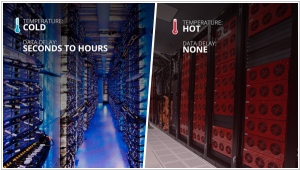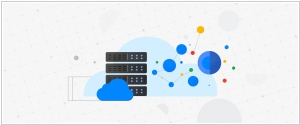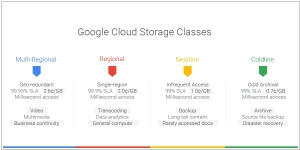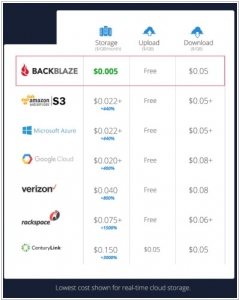Cold Cloud Storage services
Updated: August 01, 2023
Cold cloud storage is a specialized data storage service offered by cloud providers for archiving infrequently accessed data at a lower cost compared to standard cloud storage options. Unlike hot cloud storage designed for frequently accessed and real-time data, cold cloud storage is optimized for data that requires long-term retention and retrieval only when needed. This cost-effective solution is ideal for businesses and organizations looking to store large volumes of data, such as backups, historical records, regulatory compliance data, and media archives. While cold cloud storage may have slightly longer retrieval times compared to hot storage, it provides a reliable and secure way to preserve data for extended periods without incurring excessive expenses, making it a valuable resource for data-intensive applications and long-term data preservation strategies.
See also: Top 10 Public Cloud Platforms
See also: Top 10 Public Cloud Platforms
2019. Dropbox adds cold storage layer

Many individuals transfer files to Dropbox for backup purposes, but often these files are rarely accessed again. Hence, Dropbox engineers realized the impracticality of storing all files in the same manner, particularly when many files are not frequently accessed after the initial day of upload. To address this, the company decided to introduce two storage tiers: warm storage (formerly known as Magic Pocket) and a new long-term storage tier called Cold Storage. This approach allows Dropbox to store these files at a lower cost while still ensuring timely access if a customer needs to retrieve them. From the perspective of Dropbox customers, the engineering challenges associated with this approach are inconsequential. Their primary expectation is that when they click on a file, it should open quickly without significant latency, regardless of its age. However, Dropbox recognized an opportunity to store these files in a separate layer.
2019. Google launched its coldest storage service yet

Google has introduced a new cold storage service aimed at archival purposes. While this service doesn't have a flashy name, it complements Google's existing Nearline and Coldline services, offering an affordable solution for storing large quantities of infrequently accessed data. What sets this archive class apart is its cost-effectiveness, with pricing starting at just $0.0012 per gigabyte per month ($1.23 per terabyte per month). What distinguishes Google's cold storage from competitors like AWS S3 Glacier is its immediate accessibility, eliminating the millisecond latency typically associated with retrieval. Unlike other services that require users to wait before accessing their data, Google's solution allows for immediate use. This new archival cold storage service is set to launch later this year.
2019. AWS launches fully-managed backup service for business
Amazon's cloud platform, AWS, has introduced a new service called Backup, allowing companies to securely back up their data from various AWS services as well as their on-premises applications. For on-premises data backup, businesses can utilize the AWS Storage Gateway. This service enables users to define backup policies and retention periods according to their specific requirements. It includes options such as transferring backups to cold storage for EFS data or deleting them entirely after a specified duration. By default, the data is stored in Amazon S3 buckets. While most of the supported services already offer snapshot creation capabilities (except for EFS file systems), Backup automates this process and adds customizable rules to enhance data protection. Notably, the pricing for Backup aligns with the costs associated with using the snapshot features (except for file system backup, which incurs a per-GB charge).
2016. Google Cloud Platform gets new a cold storage service

Google has introduced a new cold storage service called Coldline designed for data archiving and disaster recovery purposes. Coldline serves as an alternative to Amazon Glacier, complementing Google Cloud Storage's existing similar service called Nearline. Earlier this year, Nearline transitioned out of its beta phase and underwent significant performance enhancements. Previously, data access experienced a latency of three to five seconds, but after the improvements, it became virtually real-time. Coldline now bridges the gap that was left by the upgraded Nearline service. In terms of pricing, Coldline offers storage at a cost of $0.007 per gigabyte per month, with an additional retrieval fee of $0.05 per gigabyte. In contrast, Nearline is priced at $0.01 per month. While the difference may seem small on an individual basis, the costs can accumulate rapidly for users dealing with substantial amounts of data.
2015. Backblaze offers low-cost Amazon S3 rival

Backblaze, known for its consumer and enterprise backup service, has announced Backblaze B2, a competitively priced cloud storage service that rivals Amazon S3, Microsoft Azure, and Google’s Cloud Platform. Backblaze's service is half the price of Amazon Glacier, an extremely slow cold storage service, and costs only about a fourth of Amazon’s regular S3 service. By opting for Backblaze's low-priced service, you can store an additional copy of your data for approximately 15 percent of the cost compared to Amazon's cloud storage service. Backblaze expects users to utilize B2 for storing images, videos, data sets, and more. The service includes a free tier, offering up to 10GB storage, 1GB/day of outbound traffic, and unlimited inbound bandwidth. Developers can access it through an API and command-line interface, while a web interface is also available for non-technical users.


